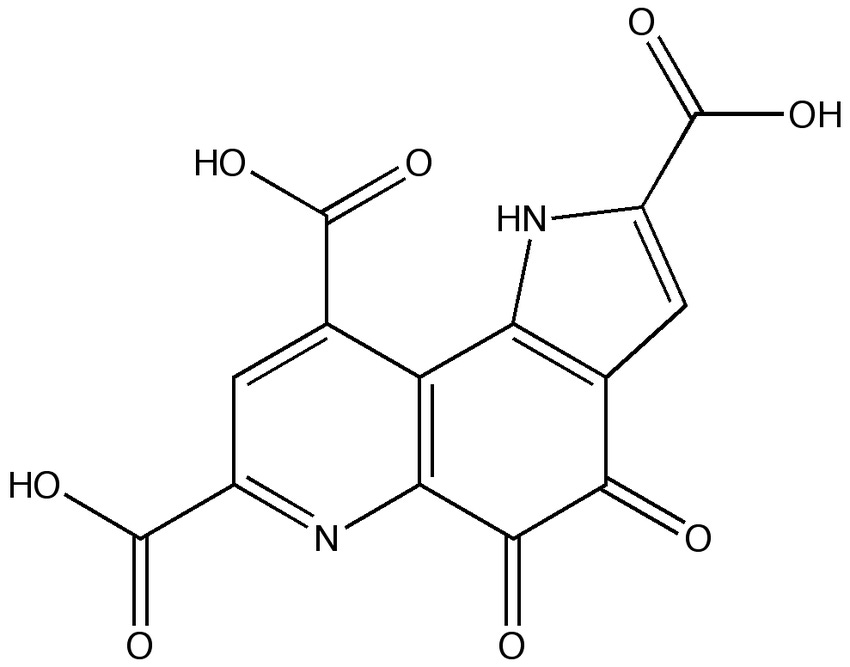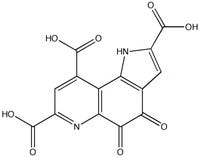Pyrroloquinoline quinone, or PQQ, is a nutrient with significant implications for mitochondrial health

Everybody needs money, including the body’s cells. On a cellular level, the currency that powers cellular functions is adenosine triphosphate (ATP). The creation of ATP begins when a person eats food. Consumed carbohydrates are broken down into simple sugars while fats are metabolized to fatty acids. A single molecule of glucose produces about 30 molecules of ATP. But the glucose does not do it in and of itself. It requires a catalyst to produce that money, and that catalyst is called coenzyme Q10 (coQ10).
The financial institution where coQ10 sets up shop is inside the inner membrane of each cell, a bank called the mitochondria. CoQ10 takes the energy created from the metabolism of simple sugars and fatty acids, shuttles the electrons through the mitochondrial membrane, and that energy released when the protons flow back into the mitochondria is used to form ATP.1 Money!
Without sufficient amounts of coQ10 in your body, your cells cannot produce ATP efficiently. The reason coQ10 is found so much in the heart, muscles, brain, kidney and liver is because these organs are the body’s biggest energy users.2 These organs are the Gatsby children – they need a lot of money.
CoQ10 is an increasingly popular dietary supplement because the most people are ever going to get in their daily diet is about 30mg/day.3 Studies conducted on coQ10’s role in ameliorating various heart conditions find efficacious doses generally ranging from 100-300mg/day.
The Qs have it
Recently, a newly discovered nutrient with significant implications for  mitochondrial health has come to the fore. First discovered in 1979, pyrroloquinoline quinone, or PQQ, was thought to be a new B vitamin. In early animal studies, rats fed a diet devoid of PQQ grew poorly and failed to reproduce.4
mitochondrial health has come to the fore. First discovered in 1979, pyrroloquinoline quinone, or PQQ, was thought to be a new B vitamin. In early animal studies, rats fed a diet devoid of PQQ grew poorly and failed to reproduce.4
Additional studies shot down the idea of PQQ being a bona fide vitamin, but its effect on mitochondrial function was undeniable. Furthermore, those rats fed a PQQ-deficient diet had reduced mitochondrial content.5 Dietary PQQ seemed to influence mitochondrial quantity!
As researchers in 2010 put it, “Bioactive compounds reported to stimulate mitochondrial biogenesis are linked to many health benefits such increased longevity, improved energy utilization, and protection from reactive oxygen species. The ability of PQQ to stimulate mitochondrial biogenesis suggests that PQQ may be beneficial in diseases associated with mitochondrial dysfunction.”6
Because of the number of mitochondria in the brain, researchers took to studying PQQ’s effects on cognitive function. A 1993 rat study investigated PQQ’s effects on nerve growth factor, which was first discovered by Rita Levi-Montalcini, who won the Nobel Prize in 1986 for that work (she died Dec. 30, 2012 at the age of 103). Nerve growth factor is essential for the development and maintenance of neurons – which transmit signals in the brain. Japanese researchers found PQQ promoted nerve growth factor growth by 40-fold compared with controls.7
Not only does PQQ promote the growth of neurons, it’s also been shown to protect neurons from oxidative damage and other insults.8
In 2008, researchers in Japan investigated the effects of PQQ and coQ10, either alone or together, on the learning ability and memory function in rats. While coQ10 exhibited some benefits, the clear winner was PQQ, which suggested a potentially protective effect against neurodegeneration caused by oxidative stress.9
Human studies
The in vitro and animal studies have been compelling enough that Japanese researchers have begun studying PQQ in human studies, three since 2009. Other Japanese researchers undertook comparing both supplemental PQQ (20mg/day) and coQ10 (300mg/day) on healthy elderly patients with cognitive decline. From the results of the studies, both bioactives were effective for improving brain function such as short-term memory and direct attention.10,11 From the open trial, PQQ is thought to be useful for improving mental stress, fatigue and sleep.12
Two of these studies were conducted by Dr. Masahiko Nakano, who is both one of the more important researchers in the recent history of PQQ as well as the general manager of BioPQQ brand of PQQ at MGC, a leading supplier of PQQ and the Functional Ingredients editor's choice award winner at Engredea 2013 for ingredient with the best science.
The first human clinical study outside Japan looks like it could take place in the U.S. Douglas S. Kalman, PhD, director of nutrition and applied clinical trials at Miami Research Associates, said his research firm is awaiting approval to start a study on PQQ. “We are evaluating PQQ as compared to placebo in older adults for the potential to ameliorate age-associated mental decline as well as affects on quality of life. This is a randomized double-blind placebo-controlled clinical trial utilizing gold standard tests and computerized tests for objective evaluation of the PQQ intervention.”
This study will use MGC's BioPQQ brand ingredient.
PQQ is only now starting to make its way into dietary supplements. It’s important for formulators to note that the amount used in successful human clinicals is 20mg/day of PQQ. Formulations that also contain coQ10 with PQQ seem to be a winning combination.
– Todd Runestad
References
1. Crane FL. Biochemical functions of coenzyme Q10. J Am Coll Nutr 2001 Dec;20(6):591-8.
2. Tran MT, Mitchell TM, Kennedy DT, Giles JT. Role of coenzyme Q10 in chronic heart failure, angina, and hypertension. Pharmacotherapy. 2001;21:797-806.
3. http://www.escholarship.org/uc/item/83c7h66t
4. Killgore J, et al. Nutritional importance of pyrroloquinoline quinone. Science 1989 Aug 25;245:850-2.
5. Stites T, et al. Pyrroloquinoline quinone modulates mitochondrial quantity and function in mice. J Nutr 2006;136:390-6.
6. Chowanadisai W, et al. Pyrroloquinoline quinone stimulates mitochondrial biogenesis through cAMP response element-binding protein phosphorylation and increased PGC-1alpha expression. J Biol Chem.2010 Jan 1;285(1):142-52.
7. Yamaguchi. Stimulation of nerve growth factor production by pyrroloquinoline quinone and it derivatives in vitro and in vivo. Biosci Biotech Biochem 1993;57:1231-3.
8. Nunome K, et al. Pyrroloquinoline quinone prevents oxidative stress-induced neuronal death probably through changes in oxidative status of DJ-1. Biol Pharm Bull 2008 Jul;31(7):1321-8.
9. Ohwada K, et al. Pyrroloquinoline Quinone (PQQ) Prevents Cognitive Deficit Caused by Oxidative Stress in Rats. J Clin Biochem Nutr.2008 Jan;42:29-34.
10. Nakano M, et al. Effect of pyrroloquinoline quinone (PQQ) on mental status of middle-aged and elderly persons. Food style21 2009;13:50-3. (Japanese)
11. Koikeda T, et al. Pyrroloquinoline quinone disodium salt improved higher brain functions. Med Consult New Remedies 2011;48:519-27.
12. Nakano M, et al. Effects of oral supplemntation with pyrroloquinoline quinone on stress, fatigue and sleep. Functional foods in health and disease 2012;2:307-24.
About the Author(s)
You May Also Like




